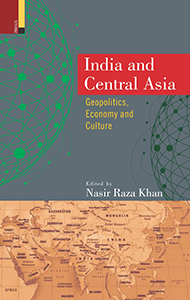
India and Central Asia: Geopolitics, Economy and Culture
EDITOR – Nasir Raza Khan
| HB ₹1495 . $64.95 . ₤42.95 |
||
INFORMATION
- EDITOR : Nasir Raza Khan
- HB ISBN : 978-93-84082-70-3
- EBOOK ISBN : 978-93-84092-36-8
- HB Year : 2016, EBOOK Year: 2017
- Extent : 206
- Discount available on checkout
- Usually dispatched within 3 to 5 working days.
India and Central Asia
| HB ₹ 1495 . $ . ₤ |
PB ₹ . $ . ₤ |
|
| POD ₹ . $ . ₤ |
e-Book ₹ . $ . ₤ |
INFORMATION
- AUTHOR –
- ISBN – 978-93-84082-70-3
- Year – 2016
- Extent: 400 + 40 coloured illustrations
- 10% discount + free shipping
- Usually dispatched within 3 to 5 working days.
India and Central Asia: Geopolitics, Economy and Culture is a collection of essays on India’s relations with the Central Asian states-Kazakhstan, Uzbekistan, Kyrgyzstan, Turkmenistan and Tajikistan-from various perspectives. Trade and cultural relations have flourished between the people of India and Central Asia, particularly along the Silk Route, since ancient times. Under colonial rule, many passages from India to Central Asia came into use. However, with the partition of the Indian subcontinent and the consequent hostility between India and Pakistan, and the emergence of Communist China, India’s direct link to the Central Asian region was cut off. The present volume makes out a case for the revival of the connectivity between India and the Central Asian states as there is a great potential in this linkage. This collection of essays explores the shared values of Central Asia and India and the common approach of a non-conflict model of international relations. The Central Asian countries and India could collaborate in sharing natural resources like minerals and the transmission of oil and gas, in which Central Asia abounds, leading to a shared security and prosperity, and cultural exchanges.
Students and scholars of International Affairs, Political Science, and Conflict Resolution will find this volume to be a necessary and useful aid in their researches. It will also be pertinent for diplomats and journalists interested in India’s long-standing cultural and economic relations with Central Asian societies, and the manner in which these relations are being re-shaped by the current political dispensation.
The Editor
Nasir Raza Khan is Associate Professor at the Academy of International Studies, Jamia Millia Islamia, New Delhi, and former Director of the Lal Bahadur Shastri Centre for Indian Culture, Tashkent, Uzbekistan. His recent publications include India, Central Asia and the World Powers (2013) and Silk Road and India: History and Chanllenges.
India and Central Asia: Geopolitics, Economy and Culture is a collection of essays on India’s relations with the Central Asian states-Kazakhstan, Uzbekistan, Kyrgyzstan, Turkmenistan and Tajikistan-from various perspectives. Trade and cultural relations have flourished between the people of India and Central Asia, particularly along the Silk Route, since ancient times. Under colonial rule, many passages from India to Central Asia came into use. However, with the partition of the Indian subcontinent and the consequent hostility between India and Pakistan, and the emergence of Communist China, India’s direct link to the Central Asian region was cut off. The present volume makes out a case for the revival of the connectivity between India and the Central Asian states as there is a great potential in this linkage. This collection of essays explores the shared values of Central Asia and India and the common approach of a non-conflict model of international relations. The Central Asian countries and India could collaborate in sharing natural resources like minerals and the transmission of oil and gas, in which Central Asia abounds, leading to a shared security and prosperity, and cultural exchanges.
Students and scholars of International Affairs, Political Science, and Conflict Resolution will find this volume to be a necessary and useful aid in their researches. It will also be pertinent for diplomats and journalists interested in India’s long-standing cultural and economic relations with Central Asian societies, and the manner in which these relations are being re-shaped by the current political dispensation.
The Editor
Nasir Raza Khan is Associate Professor at the Academy of International Studies, Jamia Millia Islamia, New Delhi, and former Director of the Lal Bahadur Shastri Centre for Indian Culture, Tashkent, Uzbekistan. His recent publications include India, Central Asia and the World Powers (2013) and Silk Road and India: History and Chanllenges.




